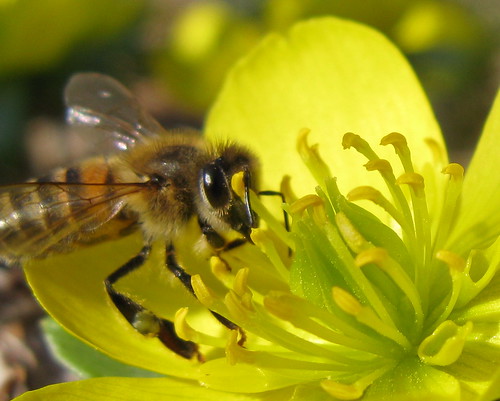今年五月,美國農業部和環保署發表蜜蜂健康報告,指出過去幾年蜜蜂數量減少原因的科學共識包括棲息地減少、寄生蟲和疾病、基因問題、營養不良和殺蟲劑。
為保護蜜蜂和其他授粉昆蟲,美國環保署15日宣布將與殺蟲劑製造商合作,於蜜蜂出沒地區引入新菸鹼類殺蟲劑產品的新標籤,以符合美國聯邦殺蟲劑、殺菌劑和殺鼠劑法的安全標準。不過環團仍要求新菸鹼類殺蟲劑應全面下架。
![]() 新標籤將包含保護蜜蜂的警告圖文及有害蜜蜂圖示,並提供曝露路徑與噴灑飄流警告資訊。此一標籤的使用將影響下列含有四種新菸鹼類成份的殺蟲劑:益達胺、達特南、可尼丁與賽速安。新菸鹼類殺蟲劑為水溶性,對於蜜蜂來說毒性極強,少量就能造成傷害,更能留在環境中好幾年。
新標籤將包含保護蜜蜂的警告圖文及有害蜜蜂圖示,並提供曝露路徑與噴灑飄流警告資訊。此一標籤的使用將影響下列含有四種新菸鹼類成份的殺蟲劑:益達胺、達特南、可尼丁與賽速安。新菸鹼類殺蟲劑為水溶性,對於蜜蜂來說毒性極強,少量就能造成傷害,更能留在環境中好幾年。
環保署和蜜蜂養殖業者、殺蟲劑使用者、殺蟲劑和種子公司、聯邦以及州政府機關合作,減少殺蟲劑噴霧飄流和改善管理方法,並發布新的作業辦法給聯邦、州以及部落執法官員,以加強蜜蜂死亡事件的調查。但環團指出,雖然這些措施都值得肯定,要保護蜜蜂卻還有更多事要做。
地球之友和殺蟲劑研究院15日發表研究報告指出,許多知名大賣場販賣號稱蜜蜂友善的家庭園藝植栽,但這些植栽其實經過殺蟲劑處理,會傷害蜜蜂或造成蜜蜂死亡。研究從美國首府華盛頓、舊金山灣區和明尼阿波利斯的主要大型量販店抽取13個植栽樣品,發現其中有7個含有新菸鹼類殺蟲劑。地球之友、Sum of Us網站和其他環團於14日將超過175,000人簽名的連署書寄給美國各大知名量販店和園藝業者,要求下架新菸鹼類殺蟲劑和含新菸鹼類殺蟲劑的植栽。環團指出,英國絕大部分的大型量販店都已經停止販賣新菸鹼類產品。
殺蟲劑研究院學者Timothy Brown博士說,「這些殺蟲劑分解速度很慢。一旦加在植栽裡,便會留在植物和土壤裡持續影響授粉昆蟲長達數月乃至數年。」園藝植栽受汙染的比例以及新菸鹼類殺蟲劑含量如此之高,顯示殺蟲劑問題影響範圍之廣,許多家庭可能無心之中已經成為蜜蜂的加害者。支持者呼籲美國環保署效法歐盟,停止使用新菸鹼類殺蟲劑。
食品安全中心政策與活動協調人Larissa Walker說,「新菸鹼類殺蟲劑也許不是蜜蜂減少的唯一原因,卻是非常顯著的因素,也是我們能立即改善的因素。環保署應該介入並且停止使用新菸鹼類殺蟲劑於蜜蜂授粉植物。」
上個月,奧勒岡州民主黨眾議院議員Earl Blumenauer和密西根州民主黨眾議院議員John Conyers提出搶救美國授粉昆蟲法案,推行停用新菸鹼類殺蟲劑於蜜蜂授粉植物,直到環保署審閱完所有的研究資料,包括田野調查數據。就在Blumenauer提出新法案前,50,000隻大黃蜂被發現死在奧勒岡州一間Target超市的停車場。該停車場附近的樹叢就使用了新菸鹼類殺蟲劑達特南。此次大黃蜂死亡事件促使奧勒岡農業部禁止將新菸鹼類殺蟲劑用於裝飾性園藝工作,直到今年底。
加拿大蜜蜂也受到波及。七月間,3700萬隻蜜蜂死於安大略的一處農田,疑似和以新菸鹼類殺蟲劑噴灑的玉米種子之粉末有關。加拿大養蜂人Dave Schuit估計,過去24小時內,他位於安大略漢諾威的養蜂場就有130萬隻蜜蜂死亡。「我認為新菸鹼類殺蟲劑來自土壤、水裡和花粉裡。」Schuit說。
根據安大略養蜂人協會的資料,類似的急性中毒事件在這個夏天相當頻繁,可能超過去年同期的240起。經實驗室確認,其中有80%的案例驗出新菸鹼類殺蟲劑的存在。
「歐洲和北美的眾多證據顯示,新菸鹼類會傷害蜜蜂、大黃蜂和其他重要的授粉昆蟲。整個社會需要立即行動,阻止這些物質充斥在環境中。」Xerces Society執行長Scott Hoffman Black說。Xerces Society是致力於保育無脊椎動物和其棲息地的非營利組織。
To protect bees and other pollinators, the U.S. Environmental Protection Agency has developed new pesticide labels that prohibit use of some neonicotinoid pesticide products where bees are present. Environmentalists want the agency to take these pesticides off the market.
“Multiple factors play a role in bee colony declines, including pesticides. The Environmental Protection Agency is taking action to protect bees from pesticide exposure and these label changes will further our efforts,” said Jim Jones, assistant administrator for the Office of Chemical Safety and Pollution Prevention.
The new labels will have a bee advisory box and bee hazard icon with information on routes of exposure and spray drift precautions.
The announcement Thursday affects products containing three neonicotinoids: imidacloprid, dinotefuran, clothianidin and thiamethoxam.
Neonicotinoids are extremely toxic to bees, even in very small amounts. The pesticides are water-soluble and persist in the environment for years.
The EPA will work with pesticide manufacturers to change their labels so that they will meet the Federal Insecticide, Fungicide, and Rodenticide Act safety standard.
In May, the U.S. Department of Agriculture and EPA released a report on honey bee health, showing scientific consensus that there are a complex set of stressors associated with honey bee declines that have lasted for years, including loss of habitat, parasites and disease, genetics, poor nutrition and pesticide exposure.
The agency works with beekeepers, growers, pesticide applicators, pesticide and seed companies, and federal and state agencies to reduce pesticide drift dust and advance best management practices.
The EPA recently released new enforcement guidance to federal, state and tribal enforcement officials to enhance investigations of beekill incidents.
But environmental groups say while these efforts are good as far as they go, much more is needed to truly protect bees.
Friends of the Earth and the Pesticide Research Institute released a report Thursday showing that some “bee friendly” home garden plants sold at Home Depot, Lowe’s and other garden centers have been pre-treated with pesticides shown to harm and kill bees.
The pilot study found that seven of 13 samples of garden plants purchased at top retailers in Washington, DC, the San Francisco Bay Area and Minneapolis contain neurotoxic pesticides known as neonicotinoids.
Friends of the Earth, Sum of Us and allies sent letters Wednesday, along with petitions signed by more than 175,000 people, to Lowe’s, Home Depot, Target and other garden retailers asking the stores to stop selling neonicotinoids and plants pre-treated with the pesticides.
The groups point out that a majority of the UK’s largest garden retailers, including Homebase, B&Q and Wickes, have already stopped selling neonicotinoids.
“These pesticides don’t break down quickly. They remain in the plants and the soil and can continue to affect pollinators for months to years after the treatment,” said Brown.
The high percentage of contaminated plants and their neonicotinoid concentrations suggest that this problem is widespread, and that many home gardens have likely become a source of harm for bees.
Bee advocates are calling for the U.S. EPA to suspend the use of neonicotinoids as the European Union has done.
Larissa Walker, policy and campaign coordinator at the Center for Food Safety, said, “While neonics may not be the only factor in bee die offs, they are a significant factor, and one that we can do something about. It’s time for EPA to step in and suspend use of these pesticides on bee-attractive plants.”
Last month, House Democrats Earl Blumenauer of Oregon and John Conyers of Michigan introduced the Save American’s Pollinators Act, which would suspend the use of neonics on bee-attractive plants until EPA reviews all of the available data, including field studies.
Blumenauer introduced the bill after 50,000 bumblebees died in a Target parking lot in Wilsonville, Oregon when the neonic pesticide dinotefuran was applied to nearby trees. The bee die-off prompted the Oregon Department of Agriculture to prohibit further cosmetic use of pesticides containing dinotefuran until the end of the year.
Canadian bees are affected too. In July, 37 million honeybees were reported dead across a single farm in Ontario from the dust associated with planting neonic-treated corn seeds.
Canadian beekeeper Dave Schuit estimates that 1.3 million bees have died in his yard north of Hanover, Ontario in the past 24 hours, reports CTV.
“I believe it’s in the soil, the neonicotinoids,” says Schuit of Saugeen Country Honey. “I believe it’s in the water and it’s in the pollen.”
According to the Ontario Bee Keepers Association, the number of acute poisonings like this is mounting this summer, and the total number of incidents is expected to surpass the 2012 season, when 240 were reported. Laboratory testing confirmed the presence of neonicotinoids in 80 percent of those cases.
“The weight of accumulated evidence from scientists across Europe and North America shows that neonicotinoids harm honey bees, bumble bees, and other important pollinators,” said Scott Hoffman Black, executive director of the Xerces Society, a nonprofit organization that protects wildlife through the conservation of invertebrates and their habitat.
“Swift action is needed by all sectors of society to reduce the prevalence of these insecticides in our environment,” said Black. “By phasing out their use, nurseries can play a leadership role in this change.”
※ 全文及圖片詳見:ENS







